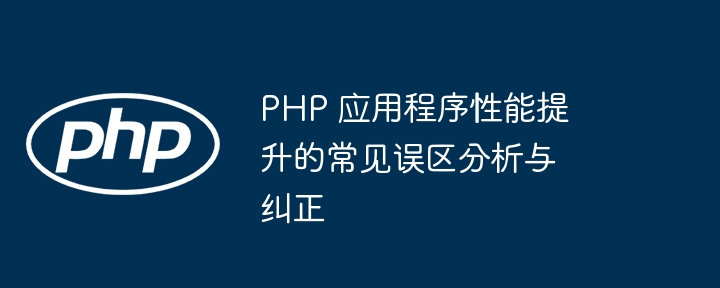Home >Backend Development >PHP Tutorial >Analysis and Correction of Common Misunderstandings on PHP Application Performance Improvement
Analysis and Correction of Common Misunderstandings on PHP Application Performance Improvement
- PHPzOriginal
- 2024-05-01 17:54:011186browse
Common misunderstandings when improving PHP application performance include: blind caching, excessive querying, ignoring garbage collection, wrong code optimization, and ignoring network latency. The corrective measures are: cache only the data that is really needed, optimize queries, use memory analysis tools, optimize code based on performance analysis, use CDN and optimize network connections. For example, for a shopping cart application, blindly caching the product list will lead to excessive memory usage. Only frequently accessed product lists should be cached and set an expiration time.

Analysis and Correction of Common Misunderstandings to Improve PHP Application Performance
Introduction
Improving the performance of PHP applications is crucial as it enhances user experience, reduces costs, and improves overall efficiency. However, during the optimization process, some common misunderstandings can lead to counterproductive results. This article will analyze these misunderstandings and provide corrective measures to help you effectively improve the performance of PHP applications.
Myth 1: Blind caching
Excessive caching may cause excessive memory usage, thus reducing performance. Caching should be used only for data that is truly needed, and cache size should be carefully considered.
Corrective Action:
- Only cache frequently accessed data.
- Implement time or size based caching mechanism.
- Use cache shards or partitions to manage memory usage.
Myth 2: Excessive database query
Frequent database queries will cause bottlenecks. The number of queries should be reduced as much as possible and query performance should be optimized.
Corrective Action:
- Use cache to store query results.
- Use indexes to speed up queries.
- Optimize queries to reduce query time.
Myth 3: Ignoring Garbage Collection
PHP uses a garbage collector to release unused memory. However, in some cases, the garbage collector may not be able to free memory in time, resulting in memory leaks and performance degradation.
Corrective Action:
- Use memory analysis tools to detect memory leaks.
- Regularly release objects that are no longer used.
- Use weak references to avoid circular references.
Myth 4: Wrong code optimization
Blindly optimizing code may cause unexpected performance overhead. Optimization should be based on actual performance analysis and should weigh the trade-offs between different technologies.
Corrective Action:
- Use performance analysis tools to identify performance bottlenecks.
- Implement incremental optimization and solve performance problems one by one.
- Only optimize code that has a significant impact on performance.
Myth 5: Ignoring network latency
Network latency is an important factor affecting application performance. Choosing the right network architecture and optimizing network connections is critical.
Corrective Action:
- Use a CDN (Content Delivery Network) to cache content.
- Enable HTTP/2 or HTTP/3 to reduce latency.
- Optimize DNS resolution to speed up page loading.
Practical Case
Consider a simple PHP shopping cart application that contains a product list and a user shopping cart. Let’s identify and correct one of these common myths:
Myth: Blindly caching product lists
Correction: Cache only frequently accessed product lists , and set the cache expiration time based on the last modification time.
Code Example:
<?php
$cacheKey = 'products-list';
if (isset($_GET['refresh'])) {
$product = [];
// Query database for products
$cache->set($cacheKey, $product, 3600); // Cache for 60 minutes
}
$product = $cache->get($cacheKey);
?>By correcting this myth, applications can significantly improve page loading speeds while avoiding unnecessary memory usage.
The above is the detailed content of Analysis and Correction of Common Misunderstandings on PHP Application Performance Improvement. For more information, please follow other related articles on the PHP Chinese website!
Related articles
See more- Looking at 'recursion' from the memory usage of Infinitus classification
- Various methods to implement page jump in PHP
- Introduction to PHP7 updates and performance optimization (pictures and text)
- What are the methods for front-end performance optimization?
- How many bytes does the string abc occupy in memory?

